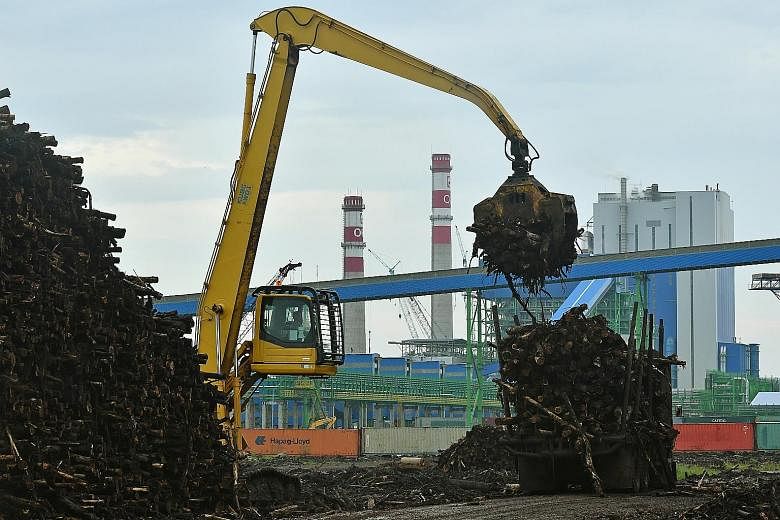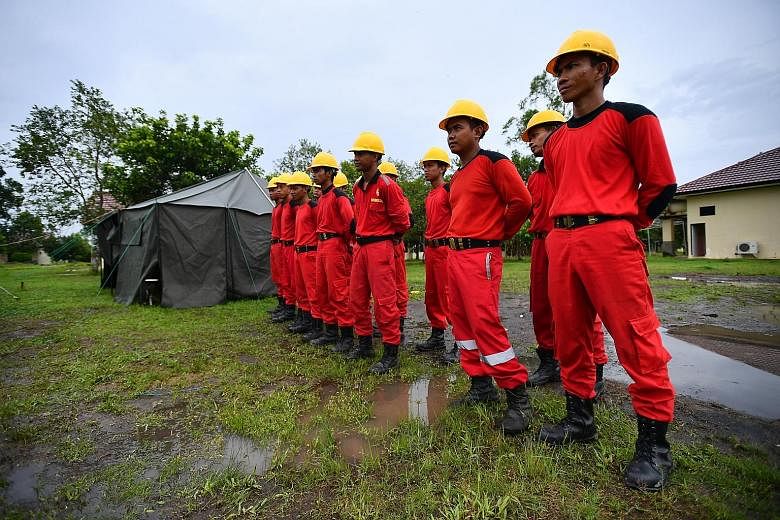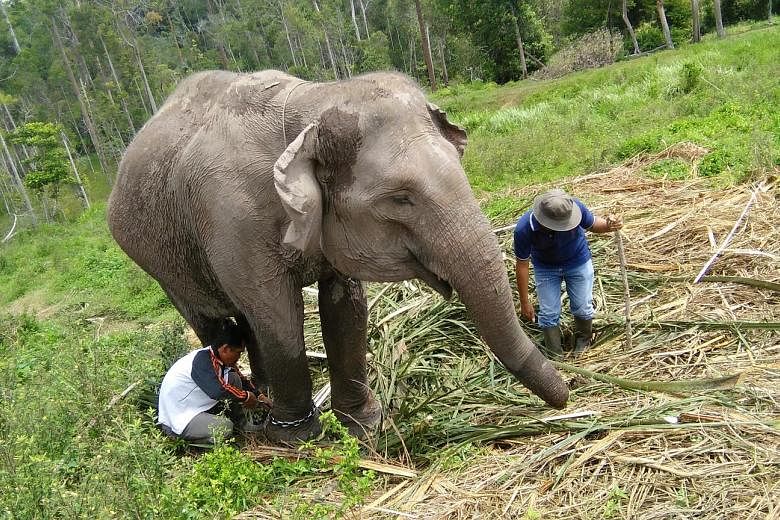Asia Pulp and Paper (APP), Indonesia's largest pulp and paper company, has since 2013 said it will not destroy natural forests to help it feed the region's appetite for paper.
Today, it is holding fast to that position - in the face of growing criticism over its third and newly operational mill in South Sumatra, which environmental groups say will cause it to renege on its promise.
The US$2.6 billion (S$3.67 billion) largely Chinese-financed mill, in the Ogan Komering Ilir (OKI) district of South Sumatra, commenced operations last December.
"The OKI pulp mill will be using 100 per cent plantation wood. We will not be cutting down natural forests... nor using wood from natural forests," stressed Mr Gadang Hartawan, head of external relations at APP's OKI Pulp and Paper Mills, during our visit to the mill last month.
Other than harvesting from Acacia trees in the plantations in OKI, Mr Hartawan, 51, said the mill will also receive wood from suppliers in other regions.
Indeed, during the recent visit, ST saw barges filled with logs from neighbouring plantations plying the river leading up to the OKI mill.
Mr Hartawan was responding to concerns raised by organisations such as the World Wide Fund for Nature (WWF) from as early as 2015, that deforestation is a "highly likely consequence for APP to supply wood for all its mills in Sumatra".
APP's two other mills are in the Jambi and Riau provinces of Sumatra. The mill in OKI is the largest and designed to produce up to 2.8 million tonnes of pulp every year.
However, APP's environmental licence issued by Indonesia's Capital Investment Coordination Agency allows it to produce less, at two million tonnes of pulp annually.
At that lower output, APP says the mill will consume 70,000ha of plantation timber a year - an area roughly the size of Singapore.
Asked if this can sustain the mill in the long term, an APP spokesman said its pulpwood supplies come from 38 supplier concessions in five provinces in Indonesia - Riau, Jambi, South Sumatra, West Kalimantan and East Kalimantan.
The APP spokesman said the company has undertaken a growth and yield assessment, together with sustainability organisations The Forest Trust and Ata Marie, which was later reviewed by green group Rainforest Alliance. "APP will have enough pulpwood supplies for all three of its pulp mills," the spokesman maintained.
He added that the assessment has been revisited and updated annually based on plantation development and improvement.
ENVIRONMENTAL GROUPS DOUBTFUL
Said Mr Brian Orland from non-profit forest policy analysis group Woods and Wayside International: "The Forest Trust and Ata Marie have publicly released no data to support the claim that APP has sufficient wood supplies.
"To our knowledge, they have not disclosed critical information concerning the growth rates and plantation area on which calculations for the 2014 growth and yield study were based.
"Also, the study assessed APP's wood supply only through 2020, while the OKI mill is expected to operate for at least several decades."
APP needs to show it has a longer-term, verifiable wood-sourcing plan, say the green groups.
While the company has taken steps to improve transparency, such as by providing its concession maps to Washington-based think- tank World Resources Institute, more can be done.
APP, Indonesia's largest pulp and paper firm, has a land bank of 2.6 million ha, most of which is in Sumatra. It competes with another Indonesian company, Asia Pacific Resources International Holdings, which has a landbank of 1 million ha.
Just last week, Singapore's National Environment Agency said APP has not provided enough information to the authorities investigating fires on APP suppliers' concessions, under Singapore's Transboundary Haze Pollution Act.
CONTESTED NUMBERS
Mr Aditya Bayunanda, forest commodity leader from WWF-Indonesia, said: "Based on our estimates of pulp production at the OKI mill, as well as the plantation wood and area required, we have concluded that the mill needs a minimum of 77,606ha of net planted area for annual harvest." This estimate exceeds APP's by over 7,000ha.
A report put together by 12 NGOs last October had even bleaker estimates. If the mill was operating at its designed capacity of 2.8 million tonnes, it would need to harvest 108,648ha of plantations, under a scenario projecting high growth of the pulp-producing Acacia trees.
In a low-growth scenario, this figure goes up to 172,026ha.
"Over a five-year rotation, these scenarios imply a net planted area of between 543,240ha and 860,131ha; and a gross plantation area of between 905,401ha and 1,443,551ha," said the report.
But APP insisted that the mill would never operate at its full capacity of 2.8 million tonnes per annum, due to factors such as maintenance work. It has also taken various measures to improve yield, the spokesman added without giving details.
INSECURE SUPPLY BASE
But Mr Marcel Silvius, programme head for climate-smart land use at environmental group Wetlands International, pointed out that APP's current supply base is insecure due to a number of factors.
Draining peatlands to grow Acacia could result in soil subsidence and increase the risk of flooding, for example, and the fire risk could result in plantations being lost to fire, or the loss of the right to plant on burnt peat.
Forests in Indonesia are sometimes razed through illegal slash- and-burn methods that result in haze-belching fires that affect the region. Companies like APP said they have stopped doing this, but fires still occur on their concessions, which they blame on communities within or near their lands.
Last December, Indonesia moved to institute an immediate and total ban on peatland cultivation, prohibiting the draining and clearing of new peatland and concession land previously licensed to plantation companies. In effect, planting is allowed only on unburnt, already-cleared peatland that had been drained before.
"Long-term prospects look very weak or impossible, unless APP can develop non-drainage-based pulp production in time... using suitable peat swamp species on fully rewetted peat," said Mr Silvius.
RESEARCH INTO ALTERNATIVES
APP said it is researching more than a dozen alternative species on peatland for conservation, production and community purposes.
The spokesman said the research is expected to find species that, unlike Acacia, can thrive on near-natural conditions of peat, and, for pulpwood production species, have good pulping qualities. "Several trial sites have been established to find the best conditions required for cultivation," said the APP spokesman.
There are no known alternative pulp species for peatlands that are commercially successful today.
Mr Silvius said it is encouraging that APP is doing such research.
"The development of alternative pulp sources that grow well on rewetted peatlands is an absolute requirement to be able to address the major sustainability issues of the current drainage requiring Acacia pulp wood plantations on peat, such as huge greenhouse gas emissions, uncontrollable fire risks and soil subsidence," he said. "We see APP's efforts in this as a positive and essential step towards a more sustainable pulp sector."
Singapore-based volunteer group People's Movement to Stop Haze, also visited APP's concessions in Riau last month.
Its co-founder Tan Yi Han said APP has made efforts in fire prevention and improving transparency. However, he said, as 60 per cent of APP's concessions are on fire- prone peatland, fire risk remains high. "Current water-management systems do not prevent water loss in the peatland due to evaporation during the dry season. APP needs... a long-term solution that would allow for peat rewetting," he said.
He added that APP was also facing illegal encroachment by members of nearby communities into its conservation areas, where forests are allowed to regenerate. The team saw patches of forest being cleared and burnt on its trip.
"During our recent visit, we saw elephants chained up - it shows that current conservation areas are not big enough for them to roam freely, and how important it is for companies like APP to help protect the remaining forests," he said.
In response, the APP spokesman said the wild elephants were secured with 40m-long chains pitched to various areas throughout the day. This was done for safety reasons, he added, to prevent them from reaching nearby villages and to keep them safe.




